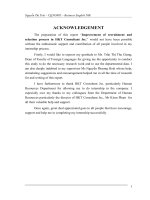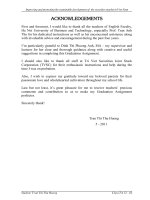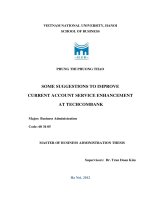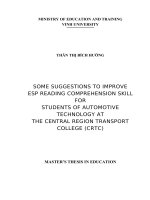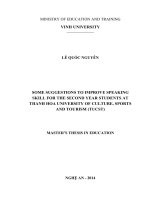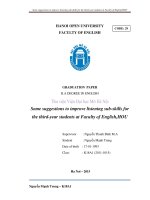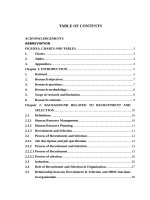Some suggestions to improve actual recruitment and selection process in lien thanh seafood processing join stock company
Bạn đang xem bản rút gọn của tài liệu. Xem và tải ngay bản đầy đủ của tài liệu tại đây (32.02 MB, 86 trang )
HO tGtU MINH CITY"UNiVERSITY Of' FOREIGN LANGUAGES AND
INFORMATION TECHNOLOGY
DEPARTMENT
OF FOREIGN LANGUAGES
GRADUATION PAPER
SOfvIE SUGGESTIONS TO Il\1PR()VE ACTUAL
RECRUITMENT
A.ND SELECTION PROCESS IN
LIEN TI-I.&.NHSEA,FOOD PROCESSINC;
JOINT-STOCK CONIPAN'{
Advisor: Mr. NGUYEN NGOC HUAN, M.B.A.
Student: TRUONG MINH XUAN LAN
Student's number: 0171005
Class: HA0101
TV Dqi Hgc Huflit
1111111111111111111111111111
101000470
ill) Chi Minh City, July 2005
1
HO CHI MINH CITY UNIVERSITY OF FOREIGN LANGUAGES AND
INFORMATION TECHNOLOGY
DEPARTMENT OF FOREIGN LANGUAGES
GRADUATION PAPER
SOME SUGGESTIONS TO IMPROVE ACTUAL
RECRUITMENT
AND SELECTION PROCESS IN
LIEN THANH SEAFOOD PROCESSING
JOINT-STOCK
Advisor:
COMPANY
Mr. NGUYEN NGOC HUAN, M.B.A.
Student: TRUONG MINH XUAN LAN
Student's number: 0171005
Class: HA0101
Ho Chi Minh City, July 2005
Dedicated to my family
ACKNOWLEDGEMENTS
In completing this graduation paper, I have received a lot of help and invaluable
advice from many helpful and respectful people.
First of all, I would like to express my sincere thanks to the Board of Foreign
Languages Department,
sent me encouragement
especially Mr. Vu Quoc Anh, M.A., Vice Dean who has
and help to my work.
In particular, I would like to express special thanks to Mr. Nguyen Ngoc Huan, my
advisor who is always enthusiastic to give me support, ideas and commentaries.
In addition, I would like to express my deepest appreciation
Ho Thi Hoa, Administrative
with the help of Ms.
Manager of Lien Thanh Seafood Processing loint-
Stock Company, Mr. Hua Thuyen, the Chairman of Viet Huong Hai Fish Sauce
Processing Limited Company and Ms. Nguyen Thi Xuan Kim, the Chief Account of
Lien Thanh Company who are willing to provide valuable information and opinions
for my study.
I am also grateful to all the authors whose books I have referred to complete this
paper.
Last but not least, I truly express my heartfelt gratitude to all my friends for their
help, support and encouragement.
ADVISOR'S COMMENTS
.................................................................................................................................
.................................................................................................................................
.................................................................................................................................
.................................................................................................................................
.................................................................................................................................
.................................................................................................................................
.................................................................................................................................
.................................................................................................................................
.................................................................................................................................
.................................................................................................................................
.................................................................................................................................
.................................................................................................................................
.................................................................................................................................
.................................................................................................................................
.................................................................................................................................
.................................................................................................................................
.................................................................................................................................
.................................................................................................................................
.................................................................................................................................
.................................................................................................................................
.................................................................................................................................
.................................................................................................................................
.................................................................................................................................
.................................................................................................................................
.................................................................................................................................
.................................................................................................................................
.................................................................................................................................
.................................................................................................................................
.................................................................................................................................
.................................................................................................................................
............................
.................................................................................................................................
.................................................................................................................................
..................................................................................................................................
.................................................................................................................................
..................................................................................................................................
.................................................................................................................................
....................................................................................................................................
..................................................................................................................................
.
EXAMINER'S COMMENTS
.................................................................................................................................
.................................................................................................................................
.................................................................................................................................
.................................................................................................................................
.................................................................................................................................
.................................................................................................................................
.................................................................................................................................
.................................................................................................................................
.................................................................................................................................
.................................................................................................................................
.................................................................................................................................
.................................................................................................................................
.................................................................................................................................
.................................................................................................................................
.................................................................................................................................
.................................................................................................................................
.................................................................................................................................
.................................................................................................................................
..................................................................................................................................
.................................................................................................................................
.................................................................................................................................
.................................................................................................................................
.................................................................................................................................
.................................................................................................................................
.................................................................................................................................
.................................................................................................................................
.................................................................................................................................
.................................................................................................................................
.................................................................................................................................
...........................
.................................................................................................................................
.................................................................................................................................
.................................................................................................................................
.................................................................................................................................
.................................................................................................................................
....................................
.................................
.................................................................................................................................
.................................................................................................................................
.
.
.
CONTENTS
Page
ACKNOWLEGEMENTS
ABSTRACT
INTRODUCTION
01
CHAPTER 1: OVERVIEW OF HUMAN RESOURCE MANAGEMENT
1.1. Understanding of human resource management
1.2. The importance of recruitment and selection
1.3. Recruitment process
IA.
Selection process
03
04
06
19
I
CHAPTER 2: GENERAL INTRODUCTION OF LIEN THANH SEAFOOD
PROCESSING JOINT-STOCK COMPANY
2.1. The history of the company
29
2.2.
Organizational structure
32
2.3.
Administrative department with human resource function
35
CHAPTER 3: ACTUAL RECRUITMENT AND SELECTION PROCESS IN
LIEN THANH SEAFOOD PROCESSING JOINT-STOCK COMPANY
3.1.
Current recruitment and selection process of the company
39
3.2. Strengths and weaknesses of the current recruitment and selection process
of the company
45
CHAPTER 4: SOME SUGGESTIONS FOR THE CURRENT RECRUITMENT
AND SELECTION PROCESS IN LIEN THANH SEAFOOD PROCESSING
JOINT -STOCK COMPANY
54
CONCLUSION
APPENDICES
REFERENCE
62
.
1
ABSTRACT
"Some suggestions
to Improve actual recruitment
and selection process in Lien
Thanh Seafood Processing Joint-Stock Company" is the subject that Iresearched in
the internship period at Administrative
Department
of Lien Thanh Company. This
study was conducted on theory arid practicality of the observations and interviews
with Lien Thanh and Viet Huong Hai Enterprises'
the recruitment
and selection
personnel managers to analyze
process of Lien Thanh Company.
showed that Lien Thanh Company's
recruitment
The findings
and selection process had some
strengths. However, it also had a number of weaknesses.
Thus, some suggestions
were given to the recruitment
improvements
could meet the requirements
and selection procedure's
of current human resource management.
so that it
INTRODUCTION
For number of years, together with the rapid economIC growth and pressure of
global
competition,
services
trying to effectively
maximize
businesses'
products
supply to their customers is a key task for all companies.
and
It requires
enterprises to devote their time, budget and energy to improve their patterns, price,
products and services
improvement,
quality as well as marketing
these businesses
strategies.
need to have effective
To achieve this
business
strategies focusing on finance, production, accounting, marketing,
management,
and human resource
management
management
administrative
is not an exception.
To any
enterprise, whether it is large or small and "whether it is nationalized or privatized,
whether it is a company, a partnership
or a co-operative"
(Nguyen & Nguyen,
2003), human resource is always a decisive factor. Schermerhorn (1996) asserts the
importance of human resource as follows, "People are our most important asset...
determines
whether our companies thrive or languishes."
Recent observations of
some medium and small businesses in Viet Nam; nevertheless,
most human resource
managers
have shown that
have given little attention to human resource
management.
This research aims at analyzing the recruitment and selection activities to improve
the businesses'
human
resource
managl:ment.
However,
being
restricted
on
graduation paper, the research doer only focuses on the recruitment and selection
process in Lien Thanh Seafood Processing Joint-Stock Company in an attempt to
find out the strengths and weaknesses
of the process so that some suggestions are
given for more efficient human resource management.
The organization
overview
of this study consists of four chapters.
of human resource management.
Chapter
one is the
Introduction to Lien Thanh Seafood
Processing Joint-Stock Company is found in chapter two. Chapter three analyses
Page 1
the current recruitment and selection process in Lien Thanh Company. Some
measures to improve the organization's
recruitment and selection process are
suggested in the final chapter.
Page 2
CHAPTER 1
OVERVIEW OF HUMAN RESOURCE
MANAGEMENT
1.1.
Understanding of Human Resource Management
Previously,
most managers
personnel management.
criteria in effectively
have considered
Recruitment,
human resource
management
as
selection, training, pays and legal are major
managing their employees.
Gradually, the managers have
recognized that these criteria have not been enough for strategic human resource
management in the severe competitive business environment.
Nowadays,
the term "human resource
management"
has become
familiar
to
anyone who involves in business world. However, its definition varies from books
to books. Different comments on human resource management
human resource
"managing
involves
specialists.
people
within
the productive
have been made by
Stone (1995) sees human resource
the employer-employee
utilization
of people
management
relationship.
in achieving
as
Specially,
it
the organization's
objectives and the satisfaction of individual employee needs" while Schuler et al.
(1996) define human resource management
of an organization's
as "the recognition of the importance
workforce as vital human resources contributing to several
functions and activities to ensure that they are used effectively
and fairly for the
benefit of the individual, the organization and society". Also, Nguyen (2004) states
that
human
recruitment,
resource
management
is an overall
selection,
maintaining,
development
brings all convenient
combination
and motivation
of planning,
activities.
It
conditions for human resource through an organization
to
reach strategic objectives and organizational vision orientation. Although the above
ideas come from different
authors, they all have one thing in common: human
Page 3
plays a center role in rea<::hi!1g_~rganiz
the highest positions in the competitive environment of business.
The social development
technologies,
has brought stable life for human. The more developed
the more modernized
equipment
we have to save time for work
operation with high productivity. Moreover, mechanical systems also replace us in
fulfilling some other tasks (Nguyen, 2004). However, machines are only machines,
they cannot work well without human. This means that human resource
important and essential to organizations'
IS
very
survival and development.
1.2. The Importance of Recruitment and Selection
Human Resource
Management
training and development,
describes the wide variety of activities such as:
performance
appraisal, compensation,
etc. Especially,
recruitment and selection are important tasks. There are three main objectives of
human resource management:
To attract potentially qualified job applicants.
To retain desirable employees.
To develop a qualified workforce.
The first objective of human resource management
can only be obtained when the
managers
procedures.
effectively
carry out the recruitment
Human
resource
planning and job analysis are useful tools supporting to recruitment and selection of
each enterprise.
The benefits of recruitment
and selection are expressed
on the
following aspects:
Firstly, the establishment of any corporation requires human resource needs so that
its operation can be smoothly run. This shows that recruitment and selection have
undeniable importance for the first activities to form organizational staff.
Page 4
Secondly,
good performances
of recruitment
....
businesses'
-
.
and selection
are the keys for
_ ....
successes because these companies possess qualified and potential job
applicants who always have good motivation and behavior for the development of
their companies' brand names.
Thirdly, the values of products and services depend heavily on a knowledgeable,
skillful and initiative workforce. Job performance efficiency and job satisfaction of
potential candidates can be devoted to a company's productivity and competitive
advantages improvement.
Last but not least, attracting and recruiting individuals whose knowledge, skills,
abilities and motivation are appropriate to the job requirement
long-term
strategies
and the company's
may help increase the success rate of the recruitment
and
selection process. As a result, budget for training and development programs is also
lowered (Nguyen, 2000).
Page 5
F
1.3.
Recruitment Process
Recruitment
can be effectively
activities provide necessary
conducted
information
once job planning
and job analysis
about job requirements
qualifications.
External Environment
Internal Environment
Human Resource Planning
1
Alternatives to Recruitment
Recruitment
Internal
Source
External
Source
Internal Method
.
External Method
Recruited Individuals
Figure 1.1: The Recruitment Process
Source: Mondy, Noe and Premeaux, 2001, Human Resource Management
Page 6
and employee
"Recruitment is the process of att~~cting individuals on a timely basis, in
sufficient numbers, and with appropriate qualifications, and encouraging them to
apply for the job with an organization. "(Mondy, Noe & Premeaux, 2001). People
whose abilities and skills are most closely related to job description and job
specification can be offered for an employment.
1.3.1. Strategic human resource planning
The leading target of human resource planning is helping the company to choose
the right person in the right position at the right time. Choosing employees with the
required
skills to accomplish
company and its employees.
organizational
objectives
is beneficial
for the
This benefit is only achieved when human resource
managers have good performance of human resource planning.
1.3.1.1.
Definition of human resource planning
In a recent study, Schermerhorn (1996) determines that human resource planning is
"the process of analyzing staffing needs and identifying actions to satisfy these
needs over time. "
Human resource planning is carried out by accessing the supply of internal and
external sources to find out the most appropriate
candidates
to the organization
over a specific period of time.
Human resource planning is important to help both organizations
and employees
prepare for the future. Human resource planning plays a key role in supporting the
organization to anticipate and overcome human resource obstacles that will prevent
the organization from fulfilling its objectives and goals. Effective human resource
planning can be a contribution for the success of other human resource activities,
such as recruitment,
selection,
training
and development.
The efficiency
recruitment and selection process cannot be achieved without careful planning.
Page 7
of
1.3.1.2.
Steps of human resource planning
Step 1: Environmental
scanning
Business
comprises
environment
of all factors which affect an organization's
activities, development and even survival.
i. External factors
Globalization: Nowadays, globalization is a reality that all enterprises should adapt
to. It has both positive and negative features. Regarding to positive feature, greater
globalization
brings more potential markets which contribute to the businesses
profits and opportunities to consolidate their positions in the market places. On the
negative
feature,
competition
becomes
more
and more
severe
in greater
globalization. Organizations have found that in order to survive, they must compete
against businesses around them, and even around the world. The companies, thus,
must try best to encompass global market, and get their missions and visions.
Demographic:
The demographic distribution forming the workforce can powerfully
constrain recruitment strategy of an organization. Therefore, it is better to include
demographic on human resource planning.
Economic: It is another important factor that human resource planners must take
into account. According to Nguyen (2004), in the period of economic crisis, the
company has to maintain qualified employees and decrease labor cost also to deal
with this economic
situation.
On the contrary,
the need
of developing
new
workforce to expand production and enhancing training programs to employees are
required when economic develops. It shows that economic directly and indirectly
impacts on employment
issues, such as: recruitment,
selection, and training and
development.
Legal: Laws and government regulations have major impacts on human resource
management.
They
are
issued
to protect
Page 8
employees'
rights
in terms
of
discrimination,
working
conditions,
health
and
safety...
Undoubtedly,
laws
significantly influence on human resource activities and it is essential to conduct
analysis on laws to ensure the success of human resource planning.
Technology:
human
In recent years, technology has had undeniable
resource.
technological
"The
change
development... "(Stone,
level
of
technological
affect
job
design,
1995).
Therefore,
roles and effects to
advancement
recruitment,
analyzing
and
rate
selection,
technological
of
training,
factor
is
necessary.
ii.
Internal factors
Business strategy: Man has become essential resource for organizational
accomplishment.
The advantages
of human resource
strategy
give organization
opportunities to form and develop long-term business strategy. Therefore,
great
human
resource planners should analyze the firm's business strategy to identify the most
appropriate
employees
for the purpose of fulfilling the organization's
goals and
mIssIOns.
Organizational
management
structure: In order to effectively
implement
a business strategy,
must assure that the design of the organizational
support the achievement
of the company's missions. Organizational
narrow or wide span directly affects employees'
structure well
structure with
productivity and behavior. The
structure of a company has a strong impact on the way the tasks are assigned and
how decisions are made. Consequently,
environmental
combined with the analysis of organizational
employees for the organization's
Environmental
advantages
scanning step should be
structure to choose high-qualified
success.
scanning helps human resource managers identify and foresee the
and disadvantages,
opportunities
Page 9
as well as challenges
that their
organizations
have to encounter so that the. ()rganizations can drive theiLstrategic
plans successfully.
Step 2: Labor demand forecast
Labor
demand
forecast
is the process
of using quantitative
and qualitative
approaches to predict the number and kinds of employee the organization will need
in the future to achieve its goals. If human resource planners fail to identify the
business demand, the number of applicants possessing the skills required for filling
job openings will be difficult to obtain, then the capacity of the organization
fulfill its function will be endangered.
to
There is, thus, a need for a careful labor
demand analysis.
Step 3: Labor supply forecast
Once the company
predicted
openings
has forecasted
depending
labor demand,
the next concern is filling
on two sources of supply: internal and external
supply.
i. Internal supply
Internal supply consists of those individuals presently work for the organization.
They can be promoted, transferred or demoted to fill desired job vacancies.
ii. External supply
External
potential
supply consists of people who do not work for the firm and may be
candidates
for the organization,
such as colleges
and universities,
employees of other organizations and the unemployed.
Human
resource
planners
audit the current
workforce
to have
an accurate
estimation about the quantity of employees. This information will allow planners to
tentatively determine labor supply of how many present employees
filling job openings.
existing employees.
However,
are ready for
not every future opening can be satisfied with
Some jobs require higher level of qualifications.
Page 10
This means
_
that human resource
presently
planners
should look for those individuals
work for the organization
who do not
and they are able to undertake
these job
vacancies.
Step 4: Policies suggestion
After carefully analyzing three previous steps, human resource managers as well
as human resource employees
will suggest some policies, conditions and action
plans to seek, attract and select human resource that are suitable for the situation of
organization's
business operations and financial capacity.
Step 5: Action programming
Action programming
is the step of bringing environmental
scannmg, personnel
need forecast, personnel supply forecast and policies suggestion into action. Most
human resource managers
who wish to get successful action programming
recognize
objectively
and implement
demotion so that the organization
the recruitment,
must
selection, promotion and
always has the right people available for the
required jobs.
Step 6: Control and evaluation
Control and evaluation master the efficiency of human resource plans at all time.
Therefore,
plan and action programming
must be frequently
and adjusted to ensure that they are always compatible
objectives
and goals. The purpose
directions
for human resource
mistakes
between
checked, reviewed
with the organizational
of control and evaluation
is to give right
planning activities, find out the differences
planning and implementation
and
and trace the reasons of these
mistakes to suggest solutions (Nguyen, 2004; Tran, 2001). In addition, control and
evaluation
also
equip
practical
and useful
managers.
Page 11
experience
for human
resource
As illustrated in figure 1.1, when human resource planning indicates the need for
employment,
the organization
should consider
contingent workers, professional
alternatives
employer organizations,
such as overtime,
outsourcing ... to satisfy
this demand. When these alternative~, are not suitable, the recruitment
process
begins.
At first, the process starts when a division has human resource requirement.
division will prepare
department.
and submit an employment
requisition
The form contains job title, department,
This
form to personnel
the number of employees
needed for work and the date the employees are desired to perform the job. This
form, then, is used to compare with job description and job specification to identify
necessary qualifications that an applicant needs to have.
The next step in the process is to determine what recruitment sources are used. An
important decision of this step is whether to utilize internal recruitment sources the candidates
from inside the organization,
or external sources - the candidates
from outside. After having an accurate consideration
about the requirements
of
potential applicants, the appropriate methods for internal or external recruitment
are applied to achieve recruitment's
Recruiting
a person
objectives.
to fulfill the organization's
llliSSlOn IS money and time-
consuming; therefore, the organization should have compatible plans and policies
to get the high effectiveness
1.3.2.
of the recruitment process.
Internal recruitment
Schermerhorn,
Hunt and Osborn (1997) define internal recruitment as "the process
for attracting applicants from those currently working for the firm. "
Successful
recruitment
process
is expressed
sufficient time.
Page 12
on hiring suitable
people
III the
There are many sources inside the company that the recruiters can use to find
applicants for job openings, such as: current employees,
employees'
acquaintances.
former employees
Among these sources, current employees
and
are always
received the first consideration because of the below advantages:
Firstly, employees
chosen inside the company have worked in the business for a
long time. They have already understood the organization's
operation
mechanism.
working environment
job performances,
mission, policies and
They only need a short period of time to adapt to new
and working conditions. Therefore,
the assessment
of their
their job satisfaction will be more accurate and objective than
those from external sources. Furthermore, internal recruitment may be effective on
saving time for orientation and training.
Secondly, recruitment through existing employees is a good approach to carry out
promotion
policy.
advancement,
Although
It provides
those
good motivation
to try their
best
for
to move from satisfaction to more satisfaction about the jobs.
internal
recruitment
has
its own
advantages,
it also
has
some
disadvantages:
Internal
recruitment
limits the influx of new creative
inbreeding in employees.
ideas
and encourages
Doing things with the old ways for job performances
is
not always efficient methods. No contribution can be made to the organization for
achieving missions and visions with inbreeding.
Another disadvantage
is that when conducting a job vacancy, numerous candidates
apply for the job opening but only one of them is chosen. Such recruitment can
impact other qualified employees'
morale. Once dissatisfactions
arise, they easily
feel bored with their jobs, especially when they make their own efforts to express
their abilities and devote their energy and time with the hope that their talents will
be admitted.
.
Page 13
1.3.2.1.
Internal recruitment sources
Present employees: When time is considered as the most important factor, present
employees
are favorable for employment requirement.
serving the organization;
therefore,
These workers have been
they only take a short period of time for
training and adapting to new positions in comparison with outsiders. The strength
of
this
approach
effectiveness
Employees'
expresses
on
the
employees'
loyalty
and
performance
because these current applicants have realized good chances.
acquaintances:
about their friends
Employees
and relatives'
in the organization
knowledge,
usually know clearly
skills, abilities
and personality.
Therefore, when the company has a requirement for employment, these employees
can be good introducers to the firm in recruiting their friends and relatives who
may be qualified candidates. This is an effective internal recruitment source that
the organization can refer to without any advertising expense.
Former employees:
organization.
They are also good job applicants to fill job vacancies of an
These candidates
are very familiar with the working environments
and they also have good relationships with current employees, so cost and time for
orienting and training can be saved. However, former employees'
not create good influence
on present employees
leave the company whenever
recruitment may
since they think that they can
they want and can easily come back without any
barrier (Nguyen, 2004).
1.3.2.2.
Internal methods of recruitment
Organizations
posting...
can use various methods, such as: computerized record systems, job
to determine
whether
qualifications
of current employees
are high
enough to perform new vacancies. Among these methods, perhaps, job posting is
the most well-known
existing employees
approach.
It is the way of notifying job openings to the
in the organization
through the utilization of notice board,
which offers the invitation for employment to all workers and employees working
Page 14
for the company. "Job openings should be prominently posted to ensure that all
employees
are easy to see them" (Mondy, Noe & Premeaux,
2001). A major
purpose of this method is to ensure the fairness and to avoid bad effects on the staff
encouraging
policies. It also gives the organization good opportunities to employ
the most appropriate
and the highest qualified candidates without searching from
outside sources.
1.3.3.
External
recruitment:
relates to attracting potential and qualified
individuals from outside of the organization.
The recruitment of a firm can be significantly influenced by external factors. It is
completely
true. Normally, when the unemployment
rate in labor market is high,
the pool of labor sources is larger than available job vacancies;
recruitment
process of an enterprise
may become
therefore,
the
simpler (Nguyen, 2000). In
addition, organization also has opportunities to choose the most qualified applicants
because there is more and more job seekers apply to these positions. Conversely, if
labor market becomes scare, the organization should find effective ways to employ
suitable candidates.
Another important factor that affects the organization's
recruitment
is its image.
The organization received good point of views from publics and government likely
attracting more and better qualified candidates for the company.
External recruitment has a number of advantages:
One big advantage of external recruitment is that applicants provide the business
new perspectives.
succession
They themselves
of the organization's
can contribute new ideas and thinking to the
objectives
and goals. Furthermore,
these new
applicants have their own effective working method in comparison with the old
ones who maintain old working methods.
Page 15
The second advantage
bigger; therefore,
is that the pool of the talents from external
the organization
sources is
has more choices to choose the best-suited
candidates.
Another advantage is that when carrying out external recruitment, human resource
managers can ensure the smooth running of the organization as they do not need to
be worried about filling any vacancy after an insider is recruited for a new position.
Together with advantages,
disadvantage
external recruitment
also has disadvantages.
is that new personnel from outside the organization
A major
typically take
longer orientation to new jobs and working environment.
Furthermore,
external
recruitment
may create
dissatisfaction
among
existing
employees when outsiders are hired and given opportunities to show their abilities
instead of present members. Moreover, recruiting from outside spends a lot of time
and expensive for attracting and selecting highly qualified candidates.
1.3.3.1.
External sources of recruitment
Depending on the nature of work and its requirements,
desired employees might be
recruited from the pool of outside sources. Colleges, universities and employment
agencies are preferred most by human resource managers.
Colleges and universities:
positions.
Candidates
are attractive sources of the employment of managerial
from those
sources
are
often
young
and have
basic
knowledge
about the jobs they have applied; hence, it is easy to train them.
Moreover,
youth is dynamic and enthusiastic,
the successful rate of achieving
organization's
mission and vision, thus, becomes higher.
Employment
agencies:
employees
are
organizations
having
for the firms which have employment
the
functions
of recruiting
needs and also helping the
applicants to locate jobs. They charge the companies and the job seekers for doing
Page 16
business. Employment agencies are reliable sources as they support the business to
recruit qualified applicants who succeeded in preliminary interview and selection
before being introduced to the organization. Therefore, finding candidates through
these agencies might satisfy the firm's employment in the shortest time.
1.3.3.2.
External methods of recruitment
After having the recruitment
sources analysis,
an organization
will determine
where potential qualified candidates are and then select the most suitable methods
for
conducting
universities
recruitment.
recruitment
Employee
referrals,
advertising,
colleges
and
are effective methods in hiring individuals with different
types of skill.
,Employee referrals: is the method of recommending
department
from the firm's employees.
job seekers to the personnel
It is considered
as the most favorable
method in attracting job applicants for the required positions. Human resource
managers usually choose employee referrals approach for some reasons:
(1) Employees
of the business know clearly about their friends who work in the
same field or closely relate to the business activities. Deep understanding
about
these potential candidates will be good referrals for recruiters to attract the most
appropriate
employees.
Because
of employees'
reputation,
they only introduce
high qualified applicants to their organization.
(2) Information
relating to the organization
has already been provided to these
potential individuals. The information enables them to have suitable selections for
joining the enterprise or not.
However, it is difficult for the company to find enough candidates for filling job
vacancies through employee referrals method.
Page 17
